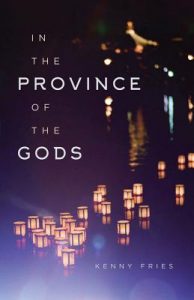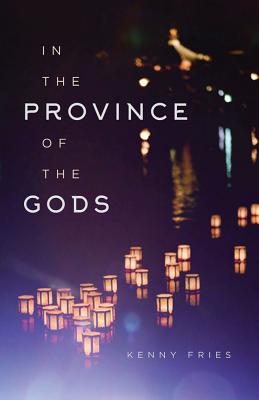 In the Province of the Gods
In the Province of the Gods
by Kenny Fries
University of Wisconsin Press. 216 pages, $26.95
POET AND MEMOIRIST Kenny Fries is a pioneer in the disability rights movement. Twenty years ago, two of his books reframed the prevailing narrative away from people being defined by their disabilities to one affirming the full lives of those living with a disability.
Fries was born with missing bones in both legs and had multiple surgeries as a child. In his Body, Remember: A Memoir (1997), Fries excavated medical records, family secrets, and early sexual explorations to reclaim wholeness. His anthology Staring Back: The Disability Experience from the Inside Out (1997) featured powerful writing by Adrienne Rich, Eli Clare, Terry Galloway, and Raymond Luczak, among others. He contributed three poignant poems about his feet, scars, and redefining beauty.
I included an essay by Fries in an anthology I co-edited, Queer Crips: Disabled Gay Men and Their Stories (2004). “Disability Made Me Do It, or Modeling for the Cause” was a caustic rumination on posing for a sex-positive depiction of a gay disabled man having sex. Since then, Fries has written a memoir juxtaposing Darwin’s theory of the survival of the fittest with the history of his orthopedic shoes, published several volumes of poetry, and written the libretto for an opera commissioned by the Houston Grand Opera.
Fries’ latest book, In The Province Of The Gods, tenderly chronicles two extended trips to Japan researching the realities of people who are physically different. Initially, what surprised him was that he was treated primarily as any other gaijin (Westerner), and not as a disabled person. When visiting ancient shrines, temples, gardens, waterfalls, and hot springs, he wondered as he relished new smells and textures: “Is this the beginning of a new way of seeing?” His poems focused on the flowers, teahouses, rocks, and bridges, but he realized that “What I was actually writing about was what was held in the gardens: a microcosm of what it means to be alive in an ever-changing mortal world. And living life in a mortal world is perhaps the greatest lesson learned from the experience of living with a disability.”
Artists, scholars, and advocates introduced Fries to the mythologies of disabled gods, one-eyed samurai, and blind priests roaming the countryside. He relived the horror of the atomic bombing and its aftermath through interviews with hibakusha (survivors). He also shares his experiences of going to gay bars and staying overnight in a “love hotel” when it became too late to get a taxi. On his second trip to Japan, he met his future husband, who was teaching English in Sapporo. Just prior to the visit, Fries learned he had sero-converted and was on tenterhooks about being HIV-positive, but his new man embraced and loved him.
In The Province Of The Gods is a finely honed philosophical and autobiographical reflection on transcendence and self-acceptance. While Fries thought he went to Japan to “understand the big picture of how those who are physically different are viewed,” ultimately his pilgrimage revealed “a visceral understanding that the body, disabled or otherwise, is a fact of a mortal life, a continuum with no before, no after.”
________________________________________________________
John R. Killacky is executive director of Flynn Center for the Performing Arts in Burlington, VT.






